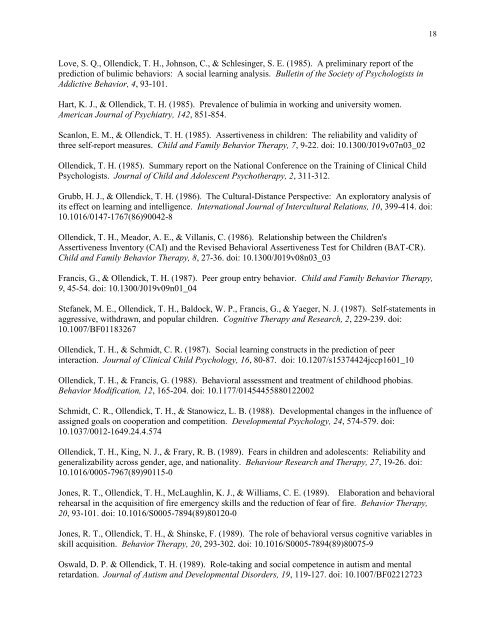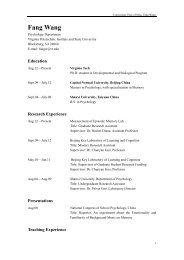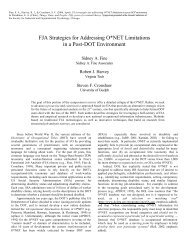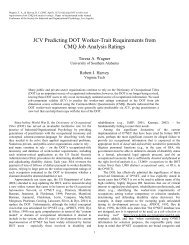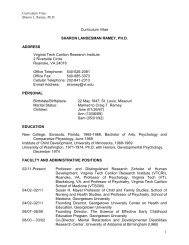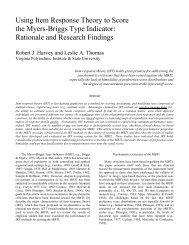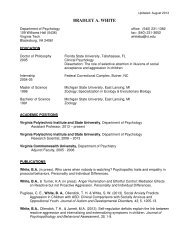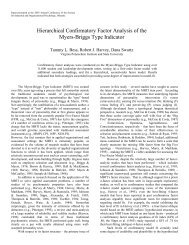Curriculum Vitae - Psychology Department - Virginia Tech
Curriculum Vitae - Psychology Department - Virginia Tech
Curriculum Vitae - Psychology Department - Virginia Tech
Create successful ePaper yourself
Turn your PDF publications into a flip-book with our unique Google optimized e-Paper software.
18<br />
Love, S. Q., Ollendick, T. H., Johnson, C., & Schlesinger, S. E. (1985). A preliminary report of the<br />
prediction of bulimic behaviors: A social learning analysis. Bulletin of the Society of Psychologists in<br />
Addictive Behavior, 4, 93-101.<br />
Hart, K. J., & Ollendick, T. H. (1985). Prevalence of bulimia in working and university women.<br />
American Journal of Psychiatry, 142, 851-854.<br />
Scanlon, E. M., & Ollendick, T. H. (1985). Assertiveness in children: The reliability and validity of<br />
three self-report measures. Child and Family Behavior Therapy, 7, 9-22. doi: 10.1300/J019v07n03_02<br />
Ollendick, T. H. (1985). Summary report on the National Conference on the Training of Clinical Child<br />
Psychologists. Journal of Child and Adolescent Psychotherapy, 2, 311-312.<br />
Grubb, H. J., & Ollendick, T. H. (1986). The Cultural-Distance Perspective: An exploratory analysis of<br />
its effect on learning and intelligence. International Journal of Intercultural Relations, 10, 399-414. doi:<br />
10.1016/0147-1767(86)90042-8<br />
Ollendick, T. H., Meador, A. E., & Villanis, C. (1986). Relationship between the Children's<br />
Assertiveness Inventory (CAI) and the Revised Behavioral Assertiveness Test for Children (BAT-CR).<br />
Child and Family Behavior Therapy, 8, 27-36. doi: 10.1300/J019v08n03_03<br />
Francis, G., & Ollendick, T. H. (1987). Peer group entry behavior. Child and Family Behavior Therapy,<br />
9, 45-54. doi: 10.1300/J019v09n01_04<br />
Stefanek, M. E., Ollendick, T. H., Baldock, W. P., Francis, G., & Yaeger, N. J. (1987). Self-statements in<br />
aggressive, withdrawn, and popular children. Cognitive Therapy and Research, 2, 229-239. doi:<br />
10.1007/BF01183267<br />
Ollendick, T. H., & Schmidt, C. R. (1987). Social learning constructs in the prediction of peer<br />
interaction. Journal of Clinical Child <strong>Psychology</strong>, 16, 80-87. doi: 10.1207/s15374424jccp1601_10<br />
Ollendick, T. H., & Francis, G. (1988). Behavioral assessment and treatment of childhood phobias.<br />
Behavior Modification, 12, 165-204. doi: 10.1177/01454455880122002<br />
Schmidt, C. R., Ollendick, T. H., & Stanowicz, L. B. (1988). Developmental changes in the influence of<br />
assigned goals on cooperation and competition. Developmental <strong>Psychology</strong>, 24, 574-579. doi:<br />
10.1037/0012-1649.24.4.574<br />
Ollendick, T. H., King, N. J., & Frary, R. B. (1989). Fears in children and adolescents: Reliability and<br />
generalizability across gender, age, and nationality. Behaviour Research and Therapy, 27, 19-26. doi:<br />
10.1016/0005-7967(89)90115-0<br />
Jones, R. T., Ollendick, T. H., McLaughlin, K. J., & Williams, C. E. (1989). Elaboration and behavioral<br />
rehearsal in the acquisition of fire emergency skills and the reduction of fear of fire. Behavior Therapy,<br />
20, 93-101. doi: 10.1016/S0005-7894(89)80120-0<br />
Jones, R. T., Ollendick, T. H., & Shinske, F. (1989). The role of behavioral versus cognitive variables in<br />
skill acquisition. Behavior Therapy, 20, 293-302. doi: 10.1016/S0005-7894(89)80075-9<br />
Oswald, D. P. & Ollendick, T. H. (1989). Role-taking and social competence in autism and mental<br />
retardation. Journal of Autism and Developmental Disorders, 19, 119-127. doi: 10.1007/BF02212723


